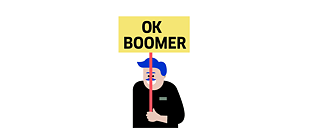Why do grown-ups like semolina porridge so much? Why do so few people have “parents”, only “mum” and “dad”? Our new columnist, the musician, author and journalist Christiane Rösinger, traces this trend towards infantilisation. Where will it lead?
In the new year, we will hear less about the “boomers” who were booming in 2024. This is because 2024 was the anniversary of the “boomers” and a “farewell to the boomers” was celebrated as many of the boomers retired. Other boomers will celebrate their 60th birthday in 2024.Staying young
The two-word phrase “Ok Boomer!” has seen its best days. It evolved from a meme in 2019 to become a catchphrase, thanks to a member of parliament in New Zealand. She casually threw “Ok Boomer!” at the elderly MP who interrupted her speech on climate change. Nowadays, an exasperated “Nah, that’s clear!” is more likely to be uttered as an expression of frustration when further explanation to a stubborn opponent seems pointless.Despite all the boomer bashing last year, I have to say: I like being a boomer. The word sounds nice to me, like the hit film La Boum or the series Here’s Boomer. There is something so irrational and youthful about saying “I’m a boomer”. It sounds much fresher and younger than Silver Ager, Best Ager, Golden Ager or even Senior Citizen. And everyone wants to sound younger, not just boomers.
Life – a child’s birthday party
Nobody wants to grow older, not even young adults. That is why we are seeing a return to childhood in many areas of life. This childhood trend started to show up in the food industry around 2010, when hipster cafes started to offer colourful, soft cakes – life should be one big children’s birthday party. It wasn’t long before the term “cupcakification” was coined to describe the phenomenon. Then smoothies and soups were everywhere, and children’s dishes such as porridge, rice pudding and jelly appeared on menus.Word! The Language Column
Our column “Word!” appears every two weeks. It is dedicated to language – as a cultural and social phenomenon. How does language develop, what attitude do authors have towards “their” language, how does language shape a society? – Changing columnists – people with a professional or other connection to language – follow their personal topics for six consecutive issues.
Not without mum and dad
And now the yearning for eternal childhood has manifested itself linguistically. Adults increasingly speak and write like five-year-olds. The word “parents” is taboo. “My mum and dad” is used not only in private but also in more formal contexts, to complete strangers. Mum and dad must be mentioned in every context: “Oh yes, Italy, my mum and dad have a holiday home there. My mum is almost 80 now and my father-in-law said …”.Why is that? Is it to use childish language to create closeness and familiarity with the other person? Is it to evoke an emotional closeness to parents, even with strangers? Or is it a longing to expose one’s own vulnerability in an increasingly transparent world? After all, anyone who says “my mum and dad” is still a child and cannot be held responsible for their own actions.
To be allowed to participate
Infantile language goes hand in hand with a new behaviour of humility and also uses the expression “to be allowed”. Experienced musicians share on Instagram that they are “allowed to play a concert”, that they are “allowed to be on stage“, as if mum and dad had given them permission. This is probably meant to convey an expression of complete self-sufficiency: “I am so humble and mindful that I even see my livelihood – making music – as a grace, a gift!” Other cultural professions are also affected by this trend: Writers are happy to be allowed to write a foreword, to be allowed to sit on a podium, presenters can’t believe their luck to be allowed to present!Will doctors soon be happy to be allowed to examine us, and traffic wardens happy to be allowed to issue parking tickets? We may well be curious.
Word! The Language Column
Our column “Word!” appears every two weeks. It is dedicated to language – as a cultural and social phenomenon. How does language develop, what attitude do authors have towards “their” language, how does language shape a society? – Changing columnists – people with a professional or other connection to language – follow their personal topics for six consecutive issues.
January 2025
